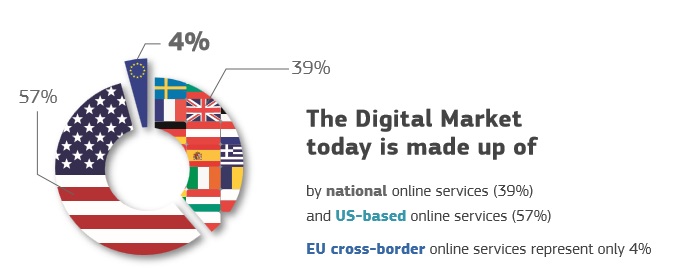 Watch out “Les Gafa” are about! So says the EU Commission. The French provided this useful acronym, which encompasses a lot more than those four leviathan companies, Google, Apple, Facebook and Amazon. It is all about entrenched EU industries protecting their turf, tax revenues (who is collecting and who is not) and all this wrapped into privacy concerns, when helpful! It was a big month for Margrethe Vestager, the European Commissioner for Competition, as she unveiled long awaited accusations against Google. There are 2 primary issues: i) Google uses its online search engine dominance (ranging from 70% to 95% in some of the 28 EU markets) to drive European consumers to its own in-house shopping services and ii) the Android mobile platform forces wireless companies into uncompetitive contracts. In many ways this is just the tip of the iceberg. Les Gafa, Airbnb, Netflix, UBER, Twitter, Whatsapp and Skype are all the subject of an EU Commission investigation into internet platforms, which will be launched by the end of 2015. The “digital single market” review is circulating, a hybrid between Vestagers team in the Competition Directorate, Günther H. Oettinger’s in that of the Digital Economy & Society and that of Andrus Ansip, Vice-President of the European Commission and the Commissioner for Europe’s Digital Single Market (DSM). The next months will see the EU DSM strategy unveiled, but the scope is now clear, including competition, tax and regulation. Check out the recently updated (03.2015) DSM fact sheet, a must read (click here to download your copy) for all those concerned by online in Europe, and that is everyone.
Watch out “Les Gafa” are about! So says the EU Commission. The French provided this useful acronym, which encompasses a lot more than those four leviathan companies, Google, Apple, Facebook and Amazon. It is all about entrenched EU industries protecting their turf, tax revenues (who is collecting and who is not) and all this wrapped into privacy concerns, when helpful! It was a big month for Margrethe Vestager, the European Commissioner for Competition, as she unveiled long awaited accusations against Google. There are 2 primary issues: i) Google uses its online search engine dominance (ranging from 70% to 95% in some of the 28 EU markets) to drive European consumers to its own in-house shopping services and ii) the Android mobile platform forces wireless companies into uncompetitive contracts. In many ways this is just the tip of the iceberg. Les Gafa, Airbnb, Netflix, UBER, Twitter, Whatsapp and Skype are all the subject of an EU Commission investigation into internet platforms, which will be launched by the end of 2015. The “digital single market” review is circulating, a hybrid between Vestagers team in the Competition Directorate, Günther H. Oettinger’s in that of the Digital Economy & Society and that of Andrus Ansip, Vice-President of the European Commission and the Commissioner for Europe’s Digital Single Market (DSM). The next months will see the EU DSM strategy unveiled, but the scope is now clear, including competition, tax and regulation. Check out the recently updated (03.2015) DSM fact sheet, a must read (click here to download your copy) for all those concerned by online in Europe, and that is everyone.
Starting with the 315 million Europeans who use the internet every day, the fact sheet sets out the EU Commission objective to establish a correctly regulated EU DSM that “can create up to €340 billion in additional growth, hundreds of thousands of new jobs, and a vibrant knowledge-based society”. However, problems are identified, check the image below and you will quickly understand the #1 problem!

Having grasped the fact that US-based online services account for 57% of the EU digital market, national (that is European) online services are just 39% and EU cross-border online services represent only 4%, you can get where the DSM strategy is headed. Three potentially game changing solutions are identified:
- Better access for consumers and businesses to digital goods and services across Europe
- Shaping the right environment for digital networks and services to flourish
- Creating a European Digital Economy and society with growth potential
The DSM’s online targets will by definition include e-commerce as well as the so-called sharing economy, in short all digital platforms from search, to shopping, to online TV and social media that “can control access to online markets and can exercise significant influence over how various players in the market are remunerated”. Wow, that is ambitious and guess what, the track record to date shows us that when it comes to competition the EC Commission delivers. Do know that on Wednesday the 22 April 2015, Vestager opened the EU case against Gazprom (Russia’s) energy giant, accused of abusing its dominant position in eastern Europe’s markets. The statement of accusations gives Gazprom 12 weeks to respond. Fines can be up to 10% of global revenues, and in Gazproms case that could be >$10B. So Google and Gazprom in one month. So it should be Gafa watch out, the EU Commissioner for Competition is about.
On the ground between countries in Europe, there is unsurprisingly divergence of DSM opinion. In the big markets, those that count in the EU, we see the German Economic Minister Sigmar Gabriel and his French counterpart stating to the EU Commission, “We believe that the growing power of some digital platforms is a wider challenge that warrants a policy consultation with the aim of establishing an appropriate general regulatory framework for ‘essential digital platforms’.” An interesting example of the issues at hand and their complexities is that of data protection. Facebook is currently the subject of data protection related probes in Belgium, the Netherlands and Germany with France and Italy expected to follow suit. In the Netherlands, their Data Protection Agency (DPA) has threatened Google with a €15m ($16.7M) penalty for breaches of privacy. DPA’s in Europe are not all the same! Shall we say that some are smaller, less well funded and listen to the companies that they regulate. This might be the case of the Irish Data Protection Commission, some 8 times smaller than their UK counterparts, they regulate 29 out of the 30 biggest technology businesses in Europe, including of course, Google, Apple, Facebook… The Irish DPA enforces Irish data privacy in its own manner. Data protection enforcement and policy differ in European countries. Belgium, France and Germany are amongst those pointing out that US technology firms benefit in Ireland from not only advantages in terms of tax, but also data protection. The Irish response given by Dara Murphy, Ireland’s Data Protection Minister is amusingly clear, “if they were all based in Paris, you would not be having the debate coming from France.”
There is a strong liberal market case against the potential digital mercantilism of the EU DSM. Many small EU countries fear a misguided attempt by the big EU countries to regulate away competition, establishing new barriers in and to Europe’s open markets, creating their national silos and champions. This is the absolute antithesis of the above espoused correctly regulated EU DSM. The EU DSM could damage the European economies and hobble its ability to compete and succeed internationally, notably in the US. Watch this space over the coming months…

